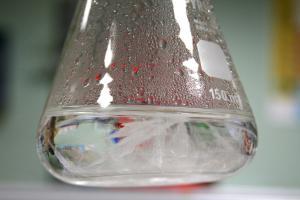CHEM 216 builds on the experimental approach started in CHEM 211. Students participate in planning exactly what they are going to do in the laboratory by being given general goals and directions that have to be adapted to fit the specific project they will be working on. They use microscale equipment, which requires them to develop manual dexterity and care in working in the laboratory. They also evaluate the results of their experiments by checking for identity and purity using various chromatographic and spectroscopic methods.
Instructor: Ginger Shultz
Course Level: Undergraduate
Available on: PBworks
Course Structure: 1 hour lecture and 4 hour lab- twice a week
This course is part of the 2011-2013 MELO 3D project, supported by an LSA Instructional Technology Committee New Initiatives/New Infrastructure grant.
Syllabus
Lecture
The lecture portion of the course will include discussion of reaction chemistry and stoichiometry, lab techniques, infrared spectroscopy, and nuclear magnetic resonance spectroscopy. The theme of chemistry for this term is "The Chemistry of Carbonyl Compounds". The chemistry presented corresponds to that in Chemistry 215 and the two courses should be taken together.
Lab
The laboratory in chemistry 216 is designed to build on your experience in Chemistry 211 toward the development of skills in laboratory technique and in asking and answering questions about chemistry by designing experiments. You will have some freedom to organize and design your own work and to cooperate with your classmates in solving problems.
Attendance
Attendance is absolutely critical. Students are expected to sign in each day and complete all experiments. E-mail both Dr. Shultz and your GSI in advance in the event of an absence. Turn in an excused absence form along with documentation to the 215/216 mailbox in Chemistry room 1416.
Course Grades
Course grades will be based on participation points, quizzes and lab reports. Due dates for all assignments are provided in the course schedule. Grades will be assessed separately for each lab section, in order to account for grading differences between GSIs. An average point total typically corresponds to a B+, however it is possible for all students in a single lab section to receive A's if the point total range for that lab section is narrow. Regrade requests for lab notebook pages and/or lab report assignments, and quizzes should be made in writing to Dr. Shultz no later than two weeks from the date they are returned. A grade appeal for the course must be made in writing within 6 months of the end of the term in which the original grade was assigned.
1. Participation points. Participation points will be assessed by your GSI at the beginning of each lab session and include completion of pre-lab questions, the pre-lab portion of your lab notebook pages, group experimental design (Exp. 3,4,6 & 7 only) and GSI points. Pre-lab questions will be posted prior to the start of each new experiment on the CTools site and should be written in your lab notebook along with the pre-lab portion of the experimental write up. GSI points will be assigned during each lab session by your GSI. The purpose of GSI points is to ensure that all students come to lab prepared, follow safety rules and guidelines, and are good citizens in the lab. GSI points will be assessed from 0 to 5 points. Where 0 = unexcused absence, 1 = attended, but not prepared or unsafe, 3 = prepared, 5 = outstanding.
2. Quizzes. Five short quizzes will be given through out the term to assess understanding of reaction chemistry, experimental procedure, and techniques used in each experiment. Two spectroscopy quizzes will assess understanding of NMR and IR spectroscopy. Quizzes will be based on information from lecture, the online manual, and from pre-lab questions and discussion. A lab practical quiz will be given during the last lab session and will assess ability to perform key lab techniques and use them to identify and unknown compound.
3. Lab reports. Lab reports will include a formal type-written lab report (25 points each) and lab notebook pages (10 points each). There will be no lab notebook pages due for experiment 5 and no formal lab reports due for experiments 2 & 7.
Point Distribution
Assignments Components Subtotal
Pre-lab Assignments
Questions Exp. 1,2,3,4,6 & 7 @ 2 pts each (total 12 pts)
Notebook write-up completed before lab
Exp. 1, 2, 3, 4, 6, & 7 @ 3 pts each (total 18 pts)
Participation Group Experimental Design 130 points
Exp. 3,4,6 & 7 @ 10 pts each (total 40 pts)
GSI points
5 pts per lab session X 12 sessions (total 60 pts)
Quizzes Short quizzes 5 @ 10 pts each 180 points
IR quiz 30 pts
NMR quiz 50 pts
Lab practical 50 pts
Lab Reports Formal lab reports (total 115 pts) 175 points
Exp. 1, 3, 4, & 6 @ 25 pts each
Exp. 5 @ 15 pts
Lab notebook pages
Exp. 1, 2, 3, 4, 6 & 7 @ 10 pts each (total 60 pts)
Total 485 points
Academic Integrity
Collaboration in the laboratory setting is encouraged, however all written work must be your own. Academic misconduct will result in a grade of zero on the assignment for which it takes place. Cheating on a quiz may result in failing the course. Please read the information at the LSA Site for Academic Integrity for examples of academic misconduct and other information.
About the Creators
Ginger Shultz
Ginger Shultz is a postdoctoral teaching fellow in the department of Chemistry.
| Document Title | Creator | Downloads | License |
|---|---|---|---|
|
Formal Lab Reports |
Ginger Shultz
|
||
|
Group Experimental Design |
Ginger Shultz
|
||
|
Lab Notebook |
Ginger Shultz
|
| Document Title | Creator | Downloads | License |
|---|---|---|---|
|
Experiment 1: Acetylation of Aniline |
Ginger Shultz
|
||
|
Experiment 2: Reduction of NaBH4 |
Ginger Shultz
|
||
|
Experiment 3: Esterification |
Ginger Shultz
|
||
|
Experiment 4: The Aldol Condensation- Preparation of Chalcones |
Ginger Shultz
|
||
|
Experiment 5: Identification of a Spectroscopic Unknown |
Ginger Shultz
|
||
|
Experiment 6: The Wittig Reaction |
Ginger Shultz
|
||
|
Experiment 7: The Grignard Reaction |
Ginger Shultz
|
||
|
Lab Practical |
Ginger Shultz
|
| Document Title | Creator | Downloads | License |
|---|---|---|---|
|
Course/Resource Archive in Institutional Repository (October 2012) |
Ginger Shultz
|
| Document Title | Creator | Downloads | License |
|---|---|---|---|
|
Course Schedule |
Ginger Shultz
|
| Document Title | Creator | Downloads | License |
|---|---|---|---|
|
Calculations |
Ginger Shultz
|
||
|
Lab Safety |
Ginger Shultz
|
||
|
Lab Skills |
Ginger Shultz
|
||
|
Online Chemical Databases |
Ginger Shultz
|
||
|
Spectroscopy |
Ginger Shultz
|
Jump to:
| Document Title | Creator | Downloads | License |
|---|---|---|---|
|
Experiment 1: Acetylation of Aniline |
Ginger Shultz
|
||
|
Lab Safety |
Ginger Shultz
|
| Document Title | Creator | Downloads | License |
|---|---|---|---|
|
Calculations |
Ginger Shultz
|
||
|
Experiment 2: Reduction of NaBH4 |
Ginger Shultz
|
||
|
Lab Skills |
Ginger Shultz
|
| Document Title | Creator | Downloads | License |
|---|---|---|---|
|
Experiment 3: Esterification |
Ginger Shultz
|
||
|
Group Experimental Design |
Ginger Shultz
|
| Document Title | Creator | Downloads | License |
|---|---|---|---|
|
Experiment 4: The Aldol Condensation- Preparation of Chalcones |
Ginger Shultz
|
| Document Title | Creator | Downloads | License |
|---|---|---|---|
|
Experiment 5: Identification of a Spectroscopic Unknown |
Ginger Shultz
|
| Document Title | Creator | Downloads | License |
|---|---|---|---|
|
Experiment 6: The Wittig Reaction |
Ginger Shultz
|
| Document Title | Creator | Downloads | License |
|---|---|---|---|
|
Experiment 7: The Grignard Reaction |
Ginger Shultz
|
||
|
Lab Practical |
Ginger Shultz
|
||
|
Spectroscopy |
Ginger Shultz
|



